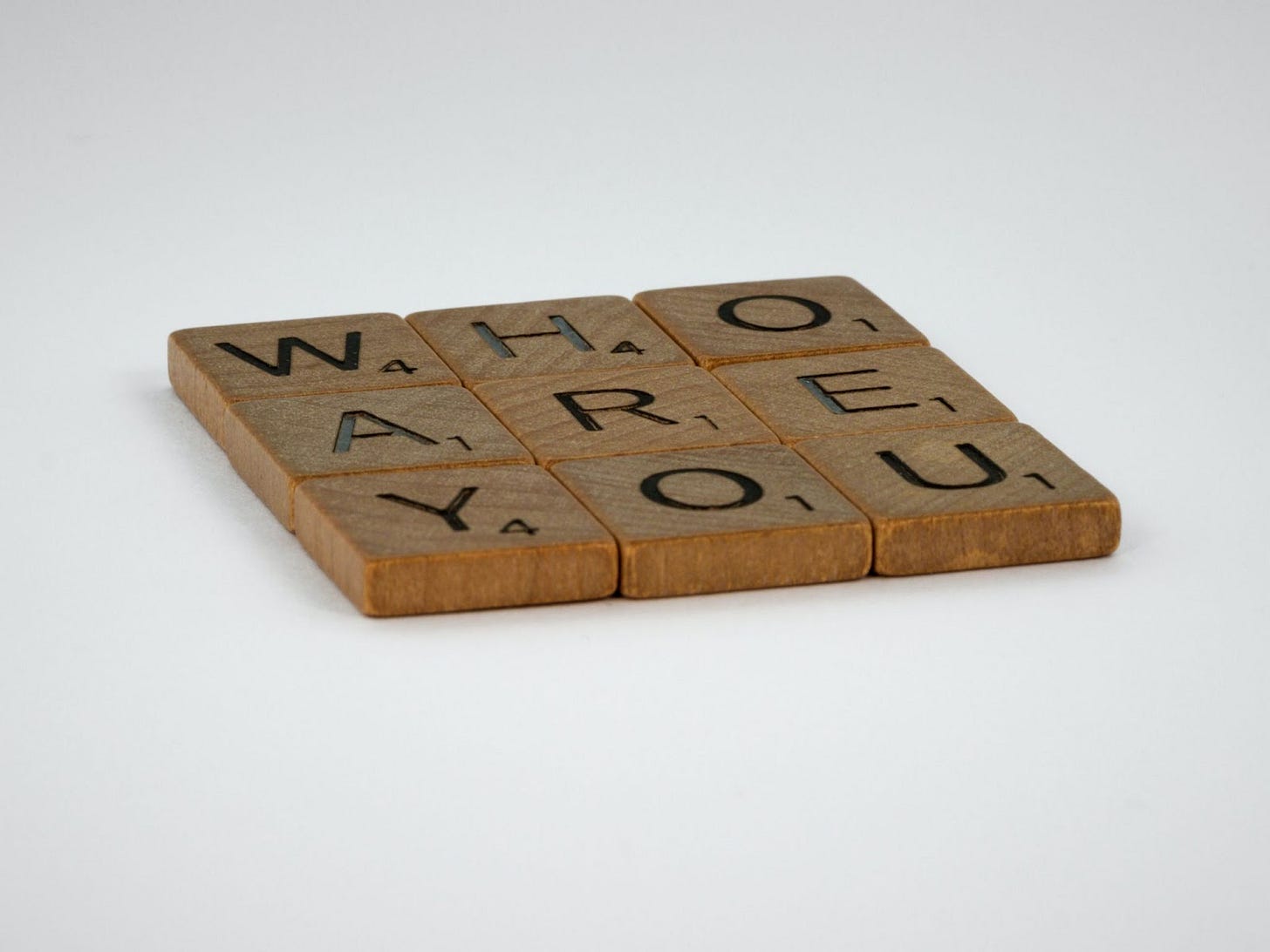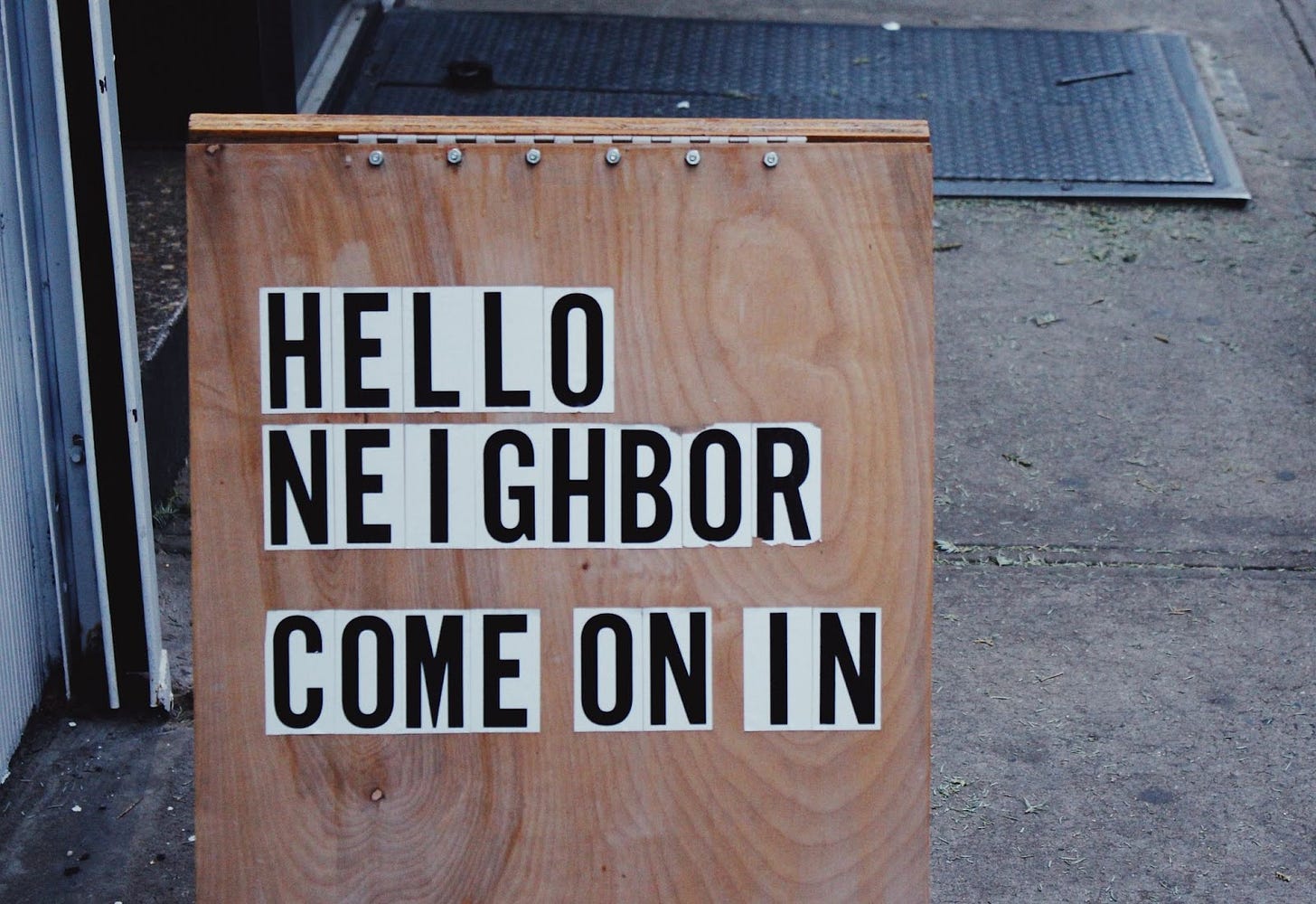Identity
Who We Are (Or Think We Are) Is Key in Our Cultural Landscape
Welcome to The Embassy!
We hope to be an Island of Faith, Humanity and Grace For Understanding Our Strange World. I'm Mike Sherman and I’ll look at culture and faith and their intersections and how that informs our stance in the world.
For a bit more explanation of The Embassy - take a look at last week’s newsletter.
Here we go -
A Link -
Two links this week, this one - The Identity Hoaxers is from about a year ago. It reviews a number of cases where people have claimed an identity different from their own.
And this one - How the World Lost It’s Story (a bit longer) was written almost twenty years ago. It is a much bigger picture view on how we understand the story we are in. It harkens back to last week, but allows us to contemplate how story and identity might go together. It is amazing to read it now, twenty years later, and see how much it resonates.
A Take -
Here’s an excerpt from The Identity Hoaxers article linked above which highlights one of the reasons people take on a different identity: (pull quote)
The notion of needing “to be associated with the victims rather than the perpetrators” is what sent me down the rabbit hole of identity hoaxers. You would be surprised at how many there are: the “pretendians,” who claim Native American ancestry, including the former Klansman who reinvented himself as a best-selling “Cherokee” author; the Syrian blogger “Gay Girl in Damascus,” who turned out to be a straight American man named Tom MacMaster; Scott Peake, who presented himself as a fluent Gaelic speaker from a remote Scottish island when he took over the Saltire Society, which promotes Scottish culture. (He was really from South London, and couldn’t speak Gaelic.)
The Identity Hoaxers, Helen Lewis, The Atlantic, 3/16/21
Lewis then goes on the catalog those who have taken on the identity of racial or sexual ‘out groups’. The need to be associated with the good guys or at least the need to not be associated with the bad guys drives a lot of our confusion related to identity. Political or social or theological takes can often fall into the category of what some have called ‘negative epistemology’ - opposing the view of others defines my view. “Those are the bad guys - what are they for? - I am against that.” This makes common ground, compromise, curiosity, humility and openness into a vice instead of a virtue. Once we define ourselves as not being someone else, we are at their mercy and will forever be in conflict.
A View -
Identity
As I write this (late April), Russian and Belarusian troops have invaded Ukraine and there has been fierce fighting in much of the country. I believe the invasion unjust, horrifying, and heartbreaking. Since the invasion, a large number of people have added an image of the Ukrainian flag to their social media profile. This has become a very common way to support a cause or identify with a group and I am not here to criticize it. I also stand with Ukraine. (I’ll have more to say on the war in future dispatches.) I stand with lots of things that people signal support for in this way. But there is, I think, something there for us to reflect on.
Is support for a good cause all that is going on here? And what light might this shed on how the understanding of our identity plays such a large part of our cultural interactions? And, the real question that I want to get to: how big a part of managing a public representation of my identity is at play here? What am I trying to accomplish? A question we should frequently ask ourselves: What am I up to?
For a different example, let’s use an issue that has been around for much longer (but has subsided a bit) and for which there are two fairly clear sides - mask wearing (with a little climate change thrown in for good measure).
I can’t agree with you … even if I agree with you
I am not here to advocate for or against wearing a mask in public or in private. I am reflecting on what we are communicating by including a mask in our social media bio. Or by opposing someone’s view (that they may otherwise agree with) because they have a mask in their avatar.
Here, identity - identifying with a group (that I think is the ‘in-group’ - whichever side it is) and, just as importantly, if not more importantly, identifying against a group - the ‘out-group’, is what is communicated. It isn’t about my opinion on this issue, or what you think about this issue - it is about what group you are in and what group I am in. For a large number of people, this is what defines their identity - at least the public representation of their identity. I am with us and against them.
But that isn’t identity. To delve deeply into what comprises our identity will take longer than I will spend here - and I’ll come back to this again I am sure. I will say for now that I believe my identity comes from being uniquely made in the image of God, from being in loving relationships with my family and friends, from being in purposeful relationship with the world around me, from living out a missional stance to the broken places of the world, from finding the joy and beauty of the parts of the world and expressions of our culture that reflect God’s image more clearly. And, just as importantly, I believe that is where your identity comes from as well - at least in part - even if we disagree about what seems like everything.
The implications of the above paragraph are profound, and have a lot to say about my stance in the world and in our culture - at least my intended stance. One implication is that my in-group (and we all probably have one) and my out-group (ditto) intersect and overlap and they probably aren’t helpfully thought of in terms of in-group and out-group. This is one implication of Jesus’ parable of The Good Samaritan (Luke 10). Jesus tells us that the greatest commandments are to love God with everything and to love our neighbor as ourselves. He then gives the Good Samaritan parable in response to a Pharisee who, wanting to justify himself, asks “And who is my neighbor?” The Samaritans were hated above all people among the Pharisees and those like them - they were the ultimate out-group. And Jesus offers one of ‘them’ as the example of loving his neighbor (who was, to the Pharisee, one of ‘us’). The Samaritan who was the example of love - The Good Samaritan - subverts the entire in-group/out-group calculation. Jesus says your neighbor is everyone, but especially the last person you would pick to love. He upends the whole world of ‘us’ and ‘them’. That particular world gives license to hate and reject - and leads me to love and treat with respect an increasingly small group of people. People who are just like me. People who have the same avatars and who oppose the same group of avatars ruthlessly, for example. This truly runs against the idea of love costing me something and bringing people together.
I am called to love my neighbor. I am called to love my neighbor with whom I disagree, who opposes my views and my ‘people’, and who is the last person I want to love or to be associated with. This is a far bigger part of my identity than anything I might post. This is a far bigger part of who I am. And, this will find expression in some purposeful action in the world, if it really is my identity.
President Obama drew some praise and some criticism for speaking ill of what he termed ‘call-out culture’. Here is part of his remarks from October of 2019:
“I do get a sense sometimes now among certain young people, and this is accelerated by social media, there is this sense sometimes of: ‘The way of me making change is to be as judgmental as possible about other people,’” he said, “and that’s enough.”
“Like, if I tweet or hashtag about how you didn’t do something right or used the wrong verb,” he said, “then I can sit back and feel pretty good about myself, cause, ‘Man, you see how woke I was, I called you out.’”
Then he pretended to sit back and press the remote to turn on a television.
“That’s not activism. That’s not bringing about change,” he said. “If all you’re doing is casting stones, you’re probably not going to get that far. That’s easy to do.”
That is easy to do. Even if we are right. And, in this, I agree with President Obama - if that is all you’re doing, you’re probably not going to get far. In my formulation, that isn’t purposeful action in the world. It might feel good, it might bond me with those of my in-group by attacking those of our shared out-group, but does it … actually do anything else? Does denouncing the rich feed the poor? Or does feeding the poor feed the poor? Or clothe the naked? Or house those living outside?
Incidentally, if you are trying to decide what kind of person I am because I favorably quoted President Obama … well, this is my point. You can’t truly tell anything about me from the above couple of paragraphs other than I agree with his point that online denunciation is not bringing about much positive change. Is President Obama in my in-group or out-group? I very much hope neither. I very much hope to stand on common ground with people wherever there is common ground to be found and to respectfully (and lovingly) disagree where we seek to step away from that common ground.
And if you have flags or symbols or whatever in your social media profile - that’s fine. I haven’t made that choice for all sorts of reasons. In any case, I want my stance in the world to be not focused on in-groups or out-groups or takes even by having a take on everything - but by real world action. Even if that action seems small scale to most, which it will of course. And I hope you get a bit of a glimpse here as well.
If you’d like to support my work, access more content, and engage with me and other subscribers here, you can subscribe to The Embassy using the button below.
You will have access to essays, conversation threads, Q & A, and all the archives. If you have a question about anything, ask it by sending me an email at theembassy@substack.com
(I believe in paying for content where I can in order to encourage more of it. I have paid subscriptions to some publications in order to encourage them and more like them in this difficult media landscape we are in. But I also know that some people want to do that and can’t. This is why The Embassy offers free subscriptions to those who want all the content and want to engage with me and other subscribers, but can’t afford it (at least right now). If that is you, please email theembassy.substack.com for a free subscription to The Embassy)







